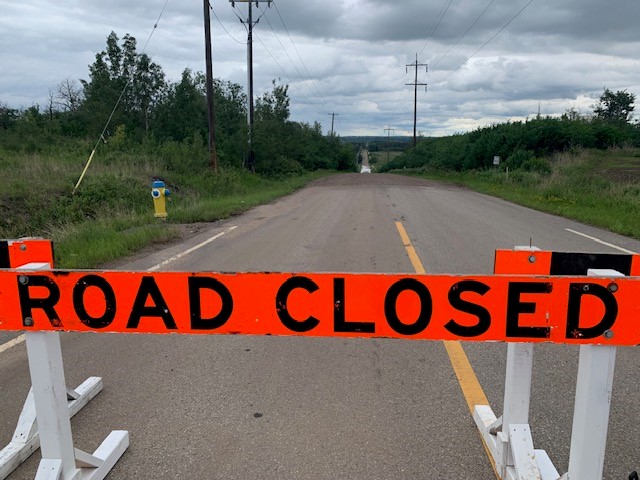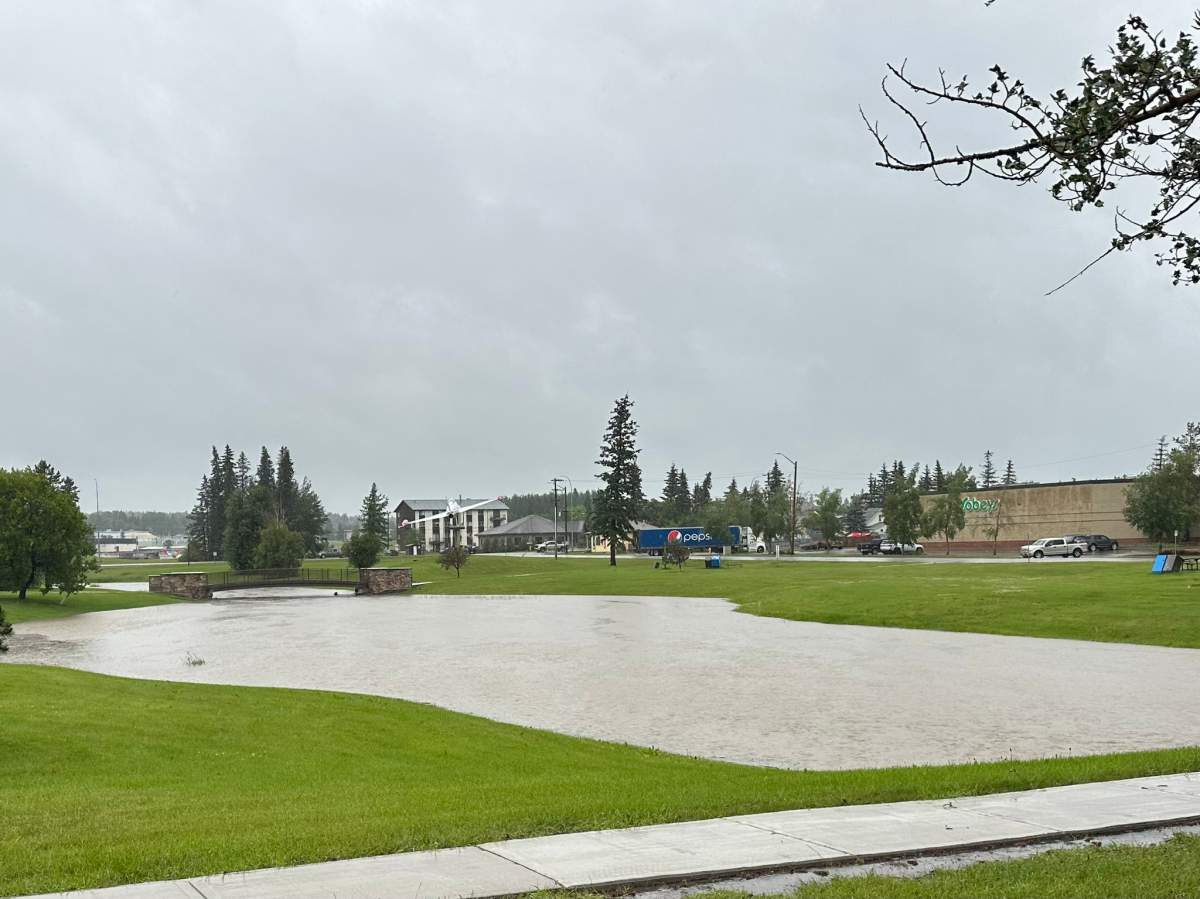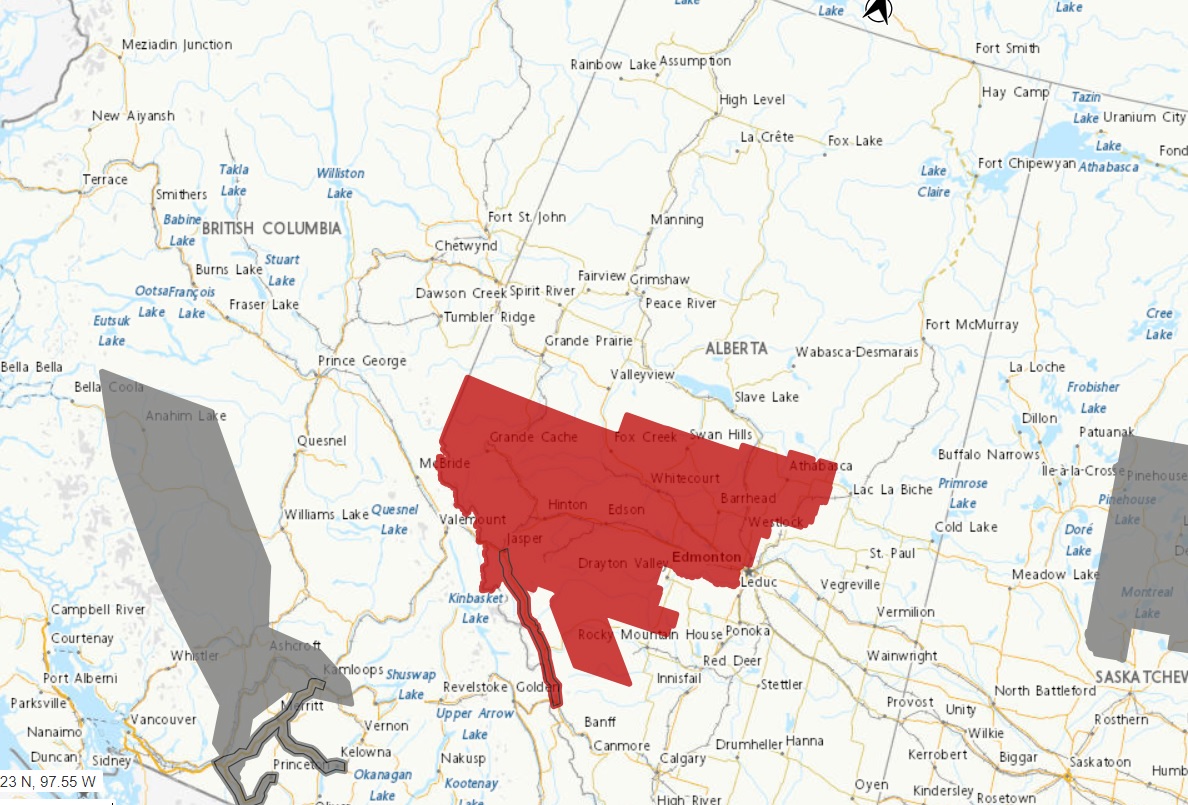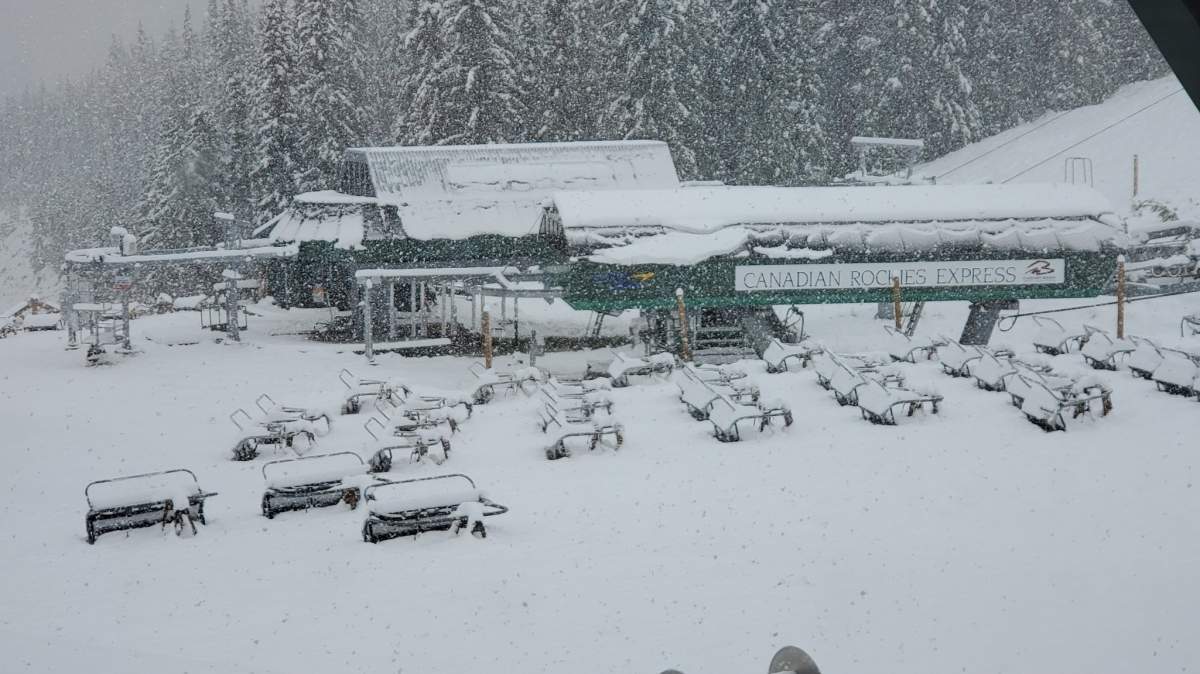Edmonton saw nearly half of the average amount of rain it usually sees for all of June in just one day.

As of 6 p.m. Sunday, the city had recorded up to 38 millimetres of rainfall. For Edmonton, the June average is 77 mm.
“We’ve seen a tremendous amount of rain so far in the city and over the course of just Sunday,” said Global Edmonton weather specialist Phil Darlington.
Darlington pointed out that the University of Alberta weather station has recorded about 129 mm of rainfall so far this June.
Some private rain gauges recorded over 40 mm of rain by Sunday night. Over the course of 24 hours, some parts of Edmonton recorded nearly 80 mm of rain.

“We’ve already exceeded our June normal, which is very interesting considering we started the month off well below normal,” said Sara Hoffman, a meteorologist for Environment and Climate Change Canada.
She said the first two weeks of June were incredibly dry. Calgary recorded zero precipitation and Edmonton recorded just 0.5 mm.
“So really, over the past six days, we’ve seen a month’s worth of rain — and more — fall in the Edmonton region,” Hoffman said.
“This amount of rain, at this time, especially for west-central portions of the province, is a little bit unusual and not as common. These rainfall amounts in 24 hours are definitely not the norm.”
Much of central and northern Alberta also saw a lot of rainfall thanks to this significant low-pressure system.
“The most rain fell west of us in Yellowhead County, around Hendrickson Creek and the Edson area,” Hoffman added.
Accumulated precipitation amounts (over an approximately 48-hour period) as of noon Monday were:
Hendrickson Creek: 132.8 mm
Carrot Creek: 128 mm
Evansburg: 108 mm
Edson: 107.5 mm
Edmonton area: 52-76 mm
Jasper: 73.5 mm
“The dichotomy of how it started and how it is right now is kind of giving us whiplash,” Hoffman said.
“It started off so hot and dry. Now we’re well below normal temperatures, with some portions of the province seeing a crazy amount of precipitation.”
Environment Canada still had rainfall warnings in effect Monday for much of central and western Alberta, including places like Yellowhead County. The weather agency said those regions could see between 40 and 80 mm of rain.
“A long period of heavy rain continues,” Environment Canada said. “Widespread rain amounts of 50 to 80 mm have already fallen, with some areas receiving over 100 mm so far.
“Heavy downpours can cause flash floods and water pooling on roads. Localized flooding in low-lying areas is possible.”

When considering what they’ve already seen in the last couple days, that could add up to more than 120 mm total, Darlington said.

Get daily National news
The town of Edson, where residents were just allowed to return home after being forced out by wildfire, declared a local state of emergency Monday due to heavy rainfall and flooding.
The town said crews were out with pumps, directing water to avoid flooding issues. Residents experiencing flooding in their homes are being told to call 780-723-6300.
“Crews are extremely busy right now and may not be able to respond right away,” town officials said in a post on Facebook.
“Once our main office lines are open again, please contact Infrastructure and Planning to make sure you’re on the tracking list of flooded properties.
“Please stay away from creeks, streams, and other bodies of water right now. We are monitoring Hillendale Pond, Centennial, and other areas and trying to mitigate issues as best we can.”

According to Alberta weather station data, the Edmonton Blatchford station accumulated about 52 mm of rain between June 16 and 19. Over the same time period, the Carrot Creek daily station recorded nearly 85 mm.
Bruce Webb, a rancher in Carrot Creek, said the flooding happened really quickly.
“It (Lobstick River) was dry – nothing flowing through it or nothing. Just overnight – like late (Sunday) afternoon around supper it was just a little stream and (Monday) morning it’s all flooded.”

He said he can see how high the water is from his house.
“Just overnight… It’s flooded a big area of it.
“I haven’t seen what it’s done to my crop fields yet.”
It’s as bad as he’s ever seen for this time of year.
“Usually in the spring and spring runoff, but not as big as this. This has been quite a few years since we’ve had this much rain,” Webb said.

There were six 24-hour rainfall records set: Bretton, Camrose, Edmonton, Edson, Elk Island and Grande Prairie.
“For the higher elevations in the Rocky Mountains, this actually fell as snow,” Hoffman said. “So we’ve had some accumulating snow especially on Highway 93 and portions of Jasper, Nordegg.
“At this time of year, most people have their summer tires on, so if you’re planning to be in the Rocky Mountains for the next couple of days here, you’ll have to drive to conditions because there’s snow on the roads.”
“Conditions in Jasper are very snowy right now,” said Brian Rode, vice-president of Marmont Basin, on Monday at 11:30 a.m.
“It’s been snowing probably for about seven or eight hours now.
“We’ve got a foot on the ground up in Marmont Basin and some trees down in Jasper, so lots of snow but it looks like the weather is going to be sunny here in a few days,” Rode said.
High streamflow advisories were also in place for much of central and western Alberta Monday, including for tributaries of the North Saskatchewan River (from Rocky Mountain House to the city of Edmonton, mainstem within the city of Edmonton), the Swan Hills watershed, the Peace River Basin (all streams in the Smoky River Basin) and the Athabasca River Basin (Pembina River Basin).
According to Alberta Rivers, water level rises in the tributaries of over 1.2 metres are possible but no flooding impacts are expected at this time.
Water levels of the North Saskatchewan as it flows through Edmonton are expected to peak late Wednesday into early Thursday, rising 1.5 metres more.
“This may impact boat launches as well as the docks near Dawson Park, Edmonton riverboat.”
There was also a flood watch for the Athabasca River Basin (parts of McLeod River near Whitecourt and Paddle River near Barrhead).
Edmonton is no longer under any rainfall alerts, but there’s still a risk of rain over the next several days.

Panex Oil and Gas controller Brenda Toews arrived at work on Monday to six inches of water in the Edmonton shop.
The building, located at 37 Street and 69 Avenue in Edmonton, experienced a bit of flooding on Thursday, Toews said, but they were able to sweep it out with brooms.
EPCOR drained it on Friday, she said, but the water returned Monday with a vengeance.
“Now we’ve got five pumps pumping out the water as fast as we can because sweeping it wasn’t working,” Toews said.
“It’s really hard to weld when you’re standing in water. So we have no production and I’m paying all my welders to sweep water.”
She said it’s very frustrating.
“Stressful because we’re going to miss deadlines… and stressful that no one’s being held accountable.”
Toews thinks the flooding is connected to a train track and ditch behind the shop.
“I’ve been here 23 years and it’s never happened before. Obviously there’s a big issue. It’s going to continue happening until someone decides what’s wrong.”

When the rain started really coming down Sunday, Charity Sagart knew her older home might have some issues.
“Last night, of course, it was flooding outside. The (basement) carpet was saturated with water so I just lifted it up and cut through the drywall and saw a little bit of a crack and followed it up and it’s there.”
She found a crack in her foundation so she called to have it assessed and repaired Monday.
“We’re getting over 100 calls a day,” said Todd Ivanochko, president of Shield Foundation Repair.
“This is just that time of year. You get a month’s worth of rain in less than three days.”
He said the most common issues are deficiencies in foundation walls, vertical cracks, leaking snap ties (the wires going through the foundation) and honeycombing (when the concrete separates and becomes porous).
“Water can be terrible. It not only wrecks the drywall, it’ll wreck the baseboards, it can wreck your flooring, it can damage any furniture in the area, and if you don’t catch it right way, it can create mould and other issues.”
“I’m in homes that were built in 2023. I’m in homes that were built in 1910. It doesn’t matter.
“We live in an environment that has a very high plastic clays, which means the more moisture you get, the more the ground swells (and) the less moisture you get, the more it shrinks. So the house is always wiggling and moving,” Ivanochko said.
He added that if homeowners notice water damage, they should try to contain the water and minimize its impact by rolling up carpet and moving any belongings away.
“People should pay attention to their downspouts and where they’re going, any negative sloping grating towards the house, that’s just encouraging more water to go up against the foundation wall.”





Comments
Want to discuss? Please read our Commenting Policy first.